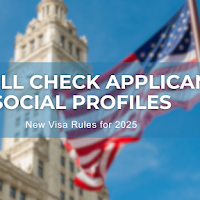The United States has officially resumed processing student visa applications after a month-long pause. However, the process now comes with significant changes that could impact how international students are assessed. Beginning June 18, 2025, the US State Department introduced a new rule requiring all students applying for F, M, and J visas—those for academic studies, vocational training, and exchange programs—to make their social media accounts publicly accessible for government review.
This change is one of the most substantial shifts in US visa procedures in recent years. The new policy requires consular officers to conduct detailed digital background checks, including reviewing applicants’ social media activities on platforms such as Facebook, Instagram, LinkedIn, and X (formerly Twitter). These measures are intended to ensure that foreign students do not pose security risks to the US.

- All student visa applicants must make their social media accounts public for government review.
- The US is prioritizing institutions with fewer than 15% international students, affecting schools like Harvard.
- Strict travel bans and visa restrictions are now in place for citizens from 19 countries.
- Privacy advocates and international educators have expressed concerns over the new policies' impact.
- The US economy could face long-term effects as fewer international students may choose to study there.
What You Need to Know About the Social Media Screening Policy
As part of this new process, consular officers will examine applicants' online presence to identify any signs of hostility toward the US or its institutions. They are also instructed to flag content that might suggest support for terrorism or other national security threats. Applicants are required to set their social media profiles to "public" throughout the visa application process. Those who refuse to comply could have their visa applications rejected, as authorities may interpret non-compliance as an attempt to conceal information.
The State Department stresses that this increased scrutiny is designed to ensure the safety and security of the country by thoroughly vetting all visa applicants. Consular officers are also required to document any concerning content they find on social media platforms.
Impact on US Universities and International Enrollment
In addition to the social media requirements, the US has implemented a new system that prioritizes student visa applications for universities where international students make up less than 15% of the total student body. This is expected to affect about 200 US universities, including prestigious schools like Harvard, where international students account for more than 25% of enrollment. The new policy could result in reduced international student enrollment at top universities, as these institutions will no longer be given priority in processing applications.
As part of a broader effort to control foreign student enrollment, the US is also implementing a two-tiered system for visa approvals. This may make it harder for students to gain admission to the country's most sought-after universities, which traditionally rely heavily on international students.
Travel Bans and Visa Restrictions
Along with these new visa requirements, the US has introduced stricter travel bans and visa restrictions. Nationals from 19 countries, including Afghanistan, Iran, and Libya, now face either complete bans on applying for US visas or restrictions on certain types of visas, including student visas. These new measures are expected to complicate the visa process for students from these countries and may limit access to the US for many prospective students.
Reactions from the Education Community
The new visa policy has sparked widespread concern among educators, international student organizations, and privacy advocates. The NAFSA: Association of International Educators warned that the changes could cause unnecessary delays, uncertainty, and damage the US's reputation as a welcoming destination for global talent. Some have expressed fears that the increased social media scrutiny could result in students being penalized for past online activity taken out of context.
Students are also anxious about how these new requirements will affect their chances of securing a visa. Many have expressed frustration and confusion over the changes, particularly those who have never before been subject to such extensive digital background checks.
Looking to the Future
With the new procedures now in place, the long-term impact on US universities and international student enrollment is yet to be seen. The US currently hosts over one million international students, who contribute more than $40 billion annually to the national economy. These new policies could have a significant effect on that financial contribution, as well as on the country's ability to attract top global talent.
As the new academic year approaches, universities will need to adapt to these changes. Institutions that rely heavily on international student enrollment may need to adjust their recruitment strategies, and many students will likely have to navigate a more complicated visa application process. The introduction of a prioritization system based on international student numbers is likely to shift the landscape of American higher education and could impact how universities across the US approach global recruitment.
The introduction of social media screening raises critical questions about the balance between national security and the US’s traditional role as a leader in global education. For international students, this change represents a dramatic shift in the way they must approach the visa process, turning their online presence into a key factor in gaining entry to the country.
As the first cohort of students goes through the enhanced screening process, the true effects of these changes will begin to emerge. The coming months will be crucial in understanding how the US’s new student visa policies will impact international enrollment and the nation's competitiveness in attracting global talent.
